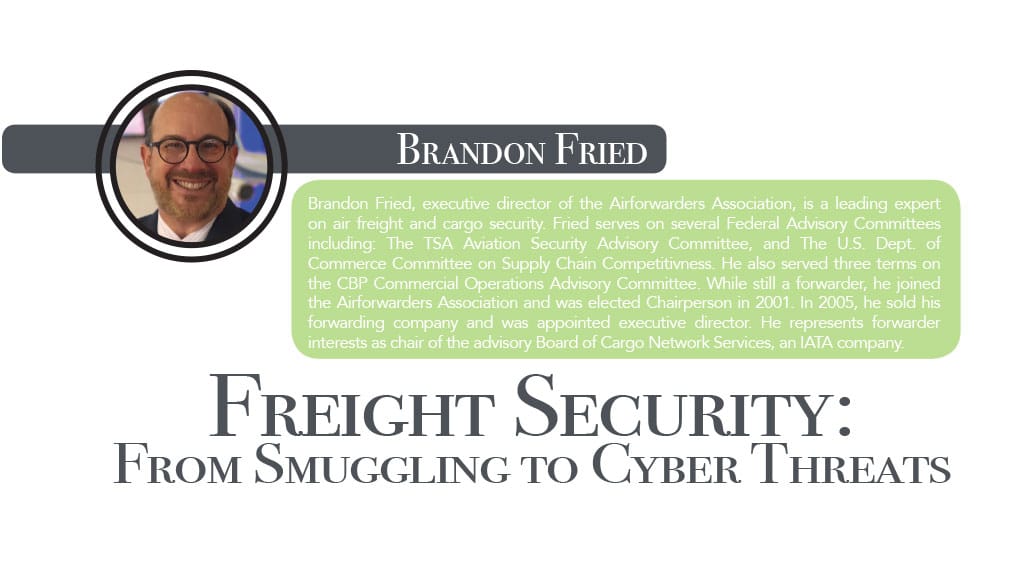Brandon Fried, executive director of the Airforwarders Association, is a leading expert on air freight and cargo security. Fried serves on several Federal Advisory Committees including: The TSA Aviation Security Advisory Committee, and The U.S. Dept. of Commerce Committee on Supply Chain Competitivness. He also served three terms on the CBP Commercial Operations Advisory Committee. While still a forwarder, he joined the Airforwarders Association and was elected Chairperson in 2001. In 2005, he sold his forwarding company and was appointed executive director. He represents forwarder interests as chair of the advisory Board of Cargo Network Services, an IATA company.
The United States is finally emerging from the worst pandemic in recent history, which changed life as we know it and caused millions of fatalities worldwide. Several medical advances, including the rapid development and deployment of a vaccine, have proven essential in facilitating any sort of recovery.
A lesser known, but still incredibly valuable player, in this effort is the freight transportation industry. Freight operators are not only enabling the distribution of essential vaccines and supplies, but also managing the unsurpassed surge in cargo volumes generated by consumers who have strongly leaned on ecommerce during this period of social distancing. Unfortunately, the industry is seeing these recent strains on the supply chain compounding the problems that existed before the pandemic. Complications caused by extensive seaport and airport congestion delays, full ships, planes and trucks, and criminal interference in the supply chain are significant risks that must be addressed quickly.
In previous decades, theft and smuggling were the primary criminal concerns of freight operators looking to protect their goods in transit. These fears are still relevant, but now shippers, freight forwarders and carriers are focused on even greater security risks. These dangers not only will delay the flow of goods, but have the potential to jeopardize global economies in unimaginable ways.
Priority number one on this list must be cybersecurity. Instances of ransomware attacks have grown exponentially since the pandemic. In fact, the United States suffered 65,000 attacks last year, almost seven an hour, with many against the freight transportation industry. While cybersecurity was once considered a minor nuisance that could be easily resolved, the cybercrime industry has evolved considerably, with ransom demands increasing by 300% in 2020.
The Colonial Pipeline ransomware attack was the most recent demonstration of the credible threat to the transportation industry as a valuable target. Major transpiration firms have suffered massive assaults in the past year, including Maersk, CMA-CGM, Forward Air and even the Martha’s Vineyard Ferry. Each of these attacks should serve as a wakeup call that cargo and transportation needs to take action to combat this expanding menace. This vigilance starts with engaging internal defensive measures within individual companies, but it’s also time for governments to get involved in the fight.
While some significant actions, such as the recent injection of Federal funding into the U.S. Cybersecurity and Infrastructure Security Agency, prove the government’s commitment to combating this criminal activity there is still much more work to be done. Protection of US businesses and constituents must be elevated as a priority by the highest level of government.
Another threat we’re seeing gain significant and dangerous traction is the shipment of undeclared hazardous materials. Each year, several incendiary fires are caused by the misdeclaration of dangerous cargo shipped in both ocean and air freight containers. Several recent high-profile maritime fires resulted in 12 ship hull losses. This substantial damage should serve as warning that misdeclarations must not be tolerated. Fortunately, the fires which have occurred in air cargo environments have taken place on the ground before shipments were loaded on aircraft, but that will not always be the case.
Regardless, if we were to see a hazardous material-related event in either a narrow ship channel such as the Suez Canal or New York’s Kill Van Kull shipping channel, it would be devastating to the maritime industry. Equally, fires onboard an aircraft while in flight would have an unspeakable and adverse impact on all aspects of aviation including both passenger and freighter flights. As in cybersecurity, governments need to play a role in battling this more physical threats as well.
Finally, the lack of consistency concerning production and transportation of lithium batteries is still causing dangerous confusion worldwide. It’s imperative that governments agree upon protocols and procedures and commit to enforcement. Without the imposition of aggressive penalties for violators who take short cuts, the entire transportation system is at risk.
During the pandemic, the freight industry dutifully served the public by transporting essential goods and facilitated access to creature comforts during an unimaginably difficult time. However, the epidemic has highlighted a significant need for supply chain resiliency in this increasingly challenging criminal and natural threat environment. Looking forward, we hope to see government work closely with industry to develop and implement mitigation strategies that support management of these threats. As we learned in 2020, we are no longer living with the question of if, but when, an unexpected disaster will strike.
